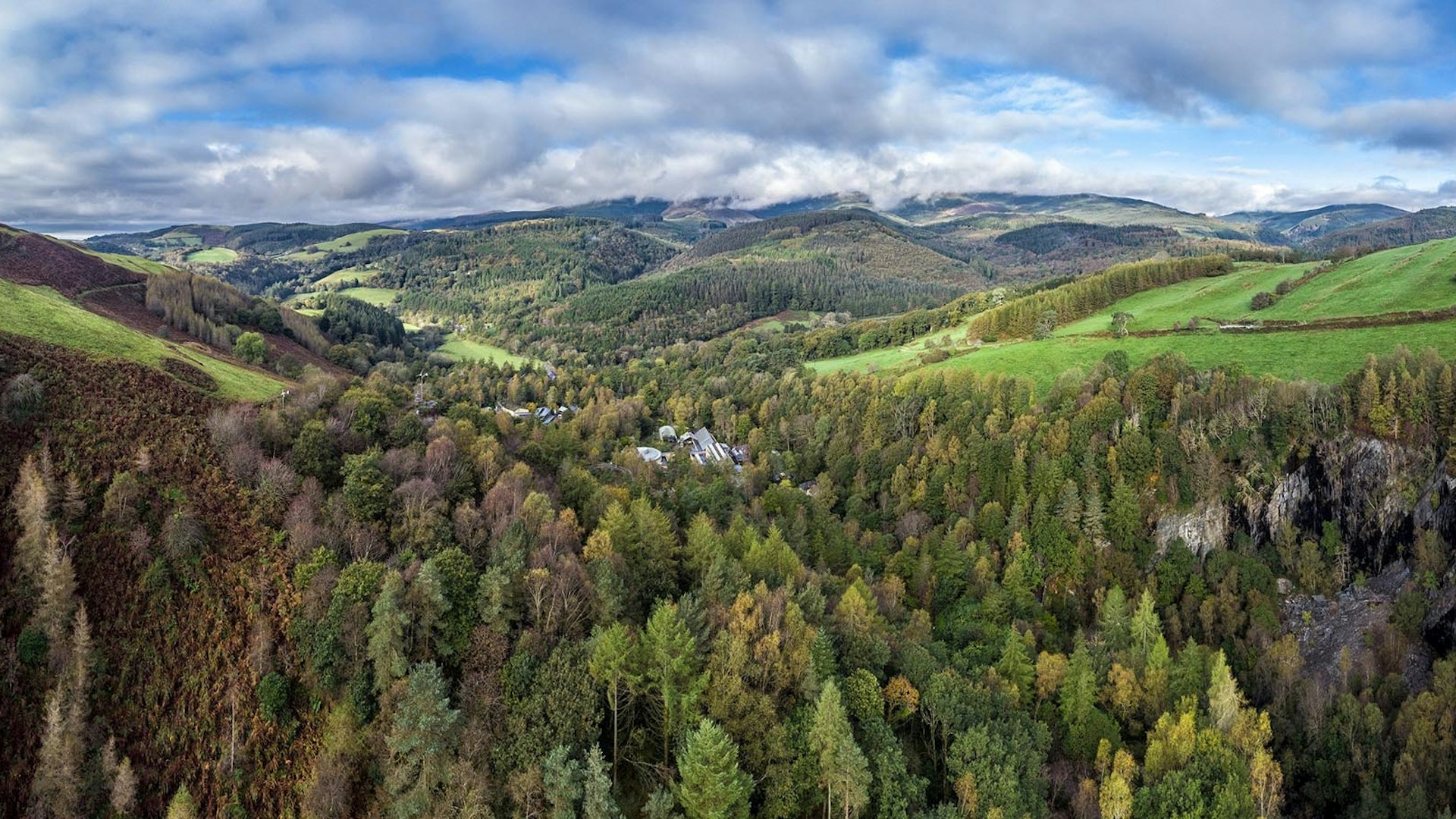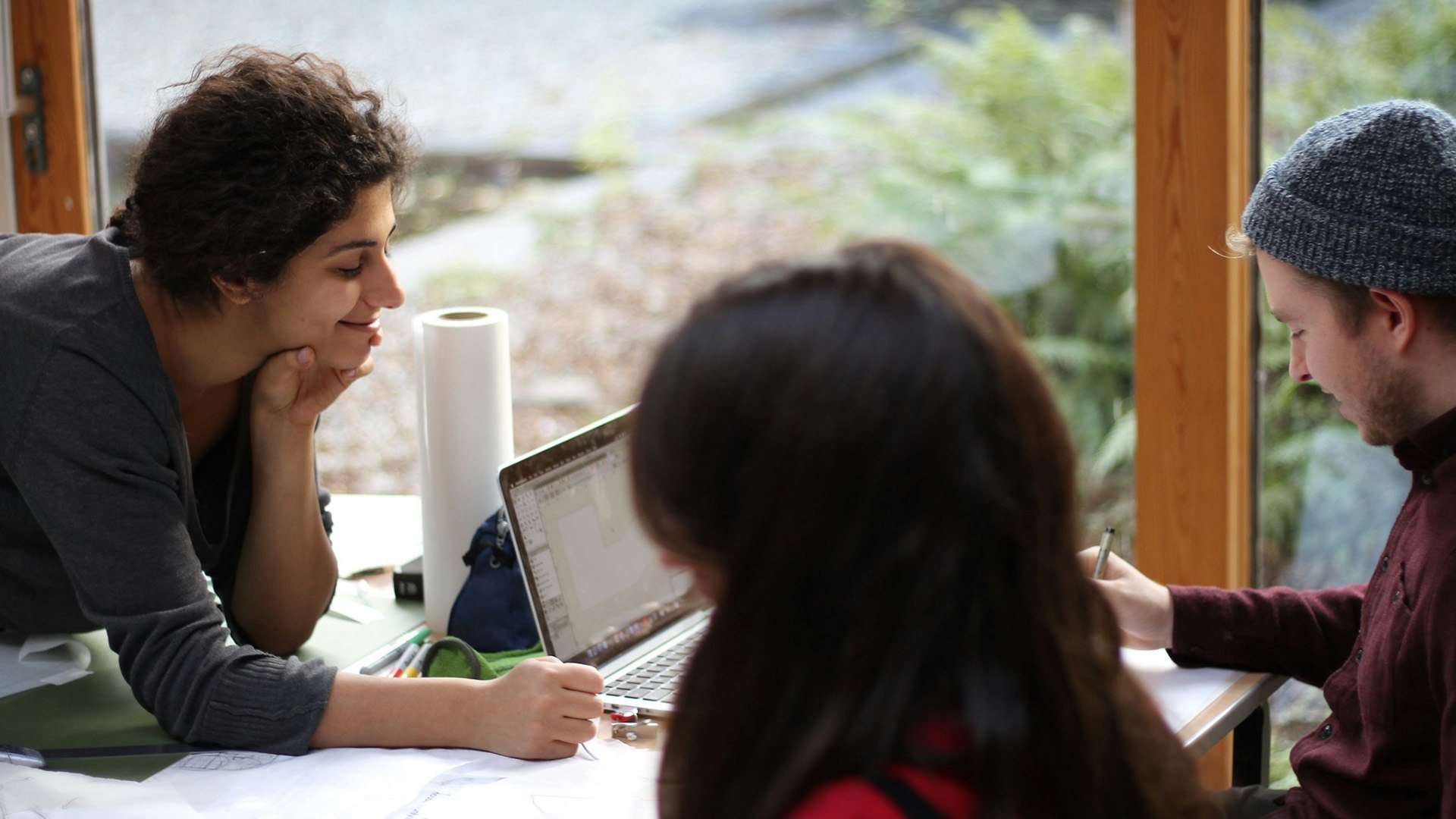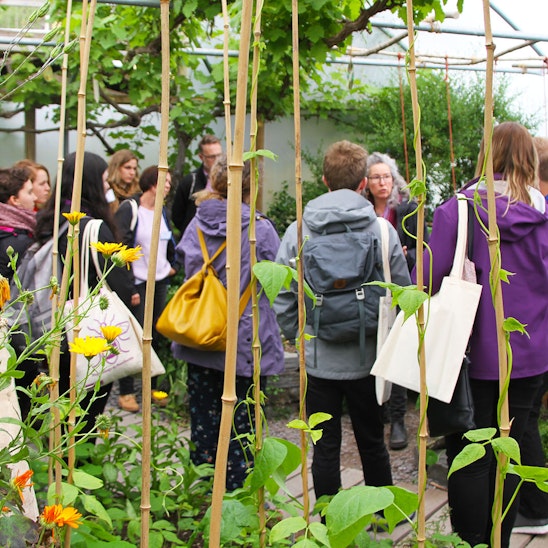MRes Sustainability and Adaptation
Master of Research

CAT Stories: Ffion Thomas
Following her studies at CAT Ffion is now working towards a PhD focusing on agroecological approaches to managing ash dieback at the Centre for Agroecology, Water and Resilience at Coventry University. Having come from a background in banking and modern languages, Ffion chose to study a postgraduate course at CAT to follow a different career path into academic research.
Core Modules
Introduction to Sustainability and AdaptationThis introductory 15-credit core module starts in September and must be taken at the beginning of your course, no matter which route you take through your studies.
In this module, we will establish the overarching concepts and theoretical grounding in sustainability, resilience and transformational adaptation, contextualise the view of current environmental changes, and explore the interconnectedness of the factors involved with these changes.
There will be an in-depth look at the wider implications of transformational adaptation on social structures and sustainability issues, including land use, trade, resource management, energy provision, governance, health and economic systems through a critical exploration of the primary considerations related to sustainability and environmental change.
The module is followed either by our ‘Sustainability and Adaptation Concepts in Practice’ module or ‘Introduction to Sustainability in Energy Provision and Demand Management’ module starting in November, depending on your programme.
This is a 15 credit module.
Read more about this module for courses awarded by the University of East London: EV7132 – Introduction to Sustainability and Adaptation (After September 2022)
Read more about this module for courses awarded by Liverpool John Moores University: 7522CATSCI – Introduction to Sustainability and Adaptation - LJMU
What’s it like to study at CAT? Read more about the teaching and learning experience.
This introductory 15-credit core module starts in November and must be taken following the ‘Introduction to Sustainability and Adaptation’ module which starts in September, at the very beginning of your course, no matter which route you take through your studies.
In this module, you will gain an understanding of transformational adaptation planning in practice through a facilitated self-reflective practical team exercise, and form a deep appreciation and holistic understanding of adaptation transformation planning strategies and processes.
You will develop the skills and knowledge needed to contextualise the discipline of transformational adaptation in relation to current environmental change and learn how to make informed decisions, despite the uncertainties that come with a changing climate.
This is a 15 credit module.
Read more about this module for courses awarded by the University of East London: EV7137 – Sustainability and Adaptation Concepts in Practice (After September 2022)
Read more about this module for courses awarded by Liverpool John Moores University: 7523CATSCI – Sustainability and Adaptation Concepts in Practice - LJMU
What’s it like to study at CAT? Read more about the teaching and learning experience.
This module, ‘Applied Research Design’, will support students in building knowledge, skills and literacy in research design and methodologies in relation to interventions, projects and applied research. It will also support students in developing a proposal for following either a conventional dissertation route or incorporating a design element within the dissertation.
The module will typically include a study visit on-site at CAT, or equivalent by distance, as scheduled in the academic calendar. It will also deliver relevant research skills for students during their final year of taught modules through attending and watching research seminars.
The Applied Research Design module will include several opportunities for enquiry and problem-based group projects in the lead up to the dissertation module.
All students will be required to carry out a teamwork-based project where they will gain experience in the research methods applied to their discipline and their use in real-world settings, through current live and applied projects.
This is a 15 credit module.
Read more about this module for courses awarded by the University of East London: EV7125 – Applied Research Design - UEL (After September 2022)
Read more about the dissertation module for courses awarded by Liverpool John Moores University 7521CATSCI - Applied Research Design - LJMU
What’s it like to study at CAT? Read more about the teaching and learning experience.
The 120-credit core MRes Dissertation module completes the MRes programme. Undertaken after completion of 60-credits of taught modules, students will apply their knowledge of research and/or design to carry out an extended independent project to explore a relevant research topic in depth, using appropriate research methodology, displaying creativity and skills in critical analysis.
During the module you will demonstrate the ability to explore a relevant research topic in-depth, with appropriate research methodology, displaying creativity and skills in critical analysis. Students will submit an extended dissertation (30,000 words maximum) at the end of the module and will also submit a research presentation and given an oral presentation on their work. Students may present a conventional written dissertation for this module, or an alternative, design focused portfolio approach that allows presentation in a non-standard format and assessment of research artefacts.
The broad nature of potential sustainability projects could adopt a quantitative, qualitative or mixed methods research design and will enable you to make use of the research skills and critical ability you have acquired in previous modules and /or prior experience.
Extended dissertation students will take a larger degree of responsibility and management of the completion of the design and research investigation. Work independently within agreed guidelines, accessing appropriate levels of supervision and support as required and use advanced time management skills for the timely submission of a research dissertation. It will be an option to undertake the research within a workplace environment.
Before beginning the module, students will be required to have gained approval for a Research Proposal (RP) on a subject from within the study area of their Programme, in consultation with one or more members of the teaching team and as a result of group discussions around initial ideas. The RP will be developed during the core ‘Applied Research Design’ module, which will cover research philosophy, approaches, strategy, design methods and analysis techniques.
This is a 120 credit module.
Read more about this module for courses awarded by the University of East London: EV7135 – MRes Dissertation (After September 2022) What’s it like to study at CAT? Read more about the teaching and learning experience.
Optional Modules
Introduction to Politics and Economics of the EnvironmentThis module introduces students to roles of power, policy, agency and economic structures that produce crises in the context of the environment, and our responses to these crises.
Through a range of topics including political and economic tools for change, environmental justice and inequalities and environment and systems change across global, national, and local scale, you will study the theoretical underpinnings to understanding the importance of political and economic systems to transformational change.
The module takes an interdisciplinary, critical approach to examine how unequal power relations have been constructed, and their environmental and societal consequences. It will consider the societal consequences of unsustainable governance of nature and the built environment.
We will also draw on current and historic social and environmental debates and events to illustrate the application of a range of critical analytical approaches, such as political ecology, discourse, global political economics, and policy studies.
This is a 15 credit module.
Read more about this module for courses awarded by the University of East London: EV7131 – Introduction to Politics and Economics of Environment (After September 2022)
Read more about this module for courses awarded by Liverpool John Moores University: 7502CATSCI - Introduction to Politics and Economics of the Environment - LJMU
What’s it like to study at CAT? Read more about the teaching and learning experience.
In this module you will learn about the complex nature of the interrelationships that exist between occupant comfort, energy flows in buildings and energy efficient building design. By exploring this through theory and applying this in practice through expert-led practical workshops, you will be able to define how energy flows and energy efficient building design relates to adaptation and sustainability in the built environment.
You will develop a systematic, holistic, multidisciplinary and analytical approach to the critical appraisal of energy-efficient design, heat flows and provision of thermal comfort with respect to the demands of climate change adaptation and the principles of sustainability.
You will cover a range of topics, including thermal comfort, thermal mass, heat transfers through building fabric and determination of U values, ventilation, sunlight and solar gain, passive cooling, climate influences on design and future climate change considerations, the impact of moisture on building fabric, quantification of building performance, embodied energy and carbon of building materials and the societal benefits of energy efficient buildings.
This is a 15 credit module. It is a recommended module for both Green Building and Sustainability in Energy Provision and Demand Management students, dependent on experience and prior knowledge.
Read more about this module for courses awarded by the University of East London: EV7128 – Energy Flows in Buildings (After September 2022)
What’s it like to study at CAT? Read more about the teaching and learning experience.
This module will introduce students to the complexities of cities and communities and their local and global interconnections. You will examine how these conditions interact with the task to transform, reclaim, and reproduce the city and built environment amid global environmental change
The module will develop your knowledge of current research and discourse concerning adaptation planning and sustainability of cities and communities, and their place in current and future environmental contexts.
You will gain a thorough understanding of key elements, including infrastructures, maintenance issues, energy budgets, material flows, waste disposal, transportation and the social dynamics that underlie the development and management of communities and cities.
Following a critical assessment of the complex factors that influence the provision of sustainability and adaptation planning within urban and community focused environments, you will be able to recognise and rationalise the prospects for innovative research and practice for regeneration in the built environment.
This is a 15 credit module.
Read more about this module for courses awarded by the University of East London: EV7105 – Cities and Communities UEL
Read more about this module for courses awarded by Liverpool John Moores University: 7504CATSCI - Cities and Communities - LJMU
What’s it like to study at CAT? Read more about the teaching and learning experience.
This module takes an in-depth look at energy provision from the perspective of transformational sustainable adaptation and takes a holistic approach to assessing energy technologies and systems situated within larger social and economic perspectives.
Students will explore the technological aspects, functioning and practical considerations of different technologies for reducing energy demand and providing more energy via sustainable sources. You will also investigate resource potential (and limitation), maintenance needs, associated carbon emissions and the environmental impacts of the available renewable energy technologies.
You will also develop a critical appreciation of the balance of energy generation and energy use reduction requirements and how energy distribution constraints, storage, supply and demand management, efficiency improvements, market drivers, planning processes, governmental policy and financial support mechanisms can affect the uptake of sustainable energy technologies.
This is a 15 credit module.
Read more about this module for courses awarded by the University of East London: EV7108 – Energy Provision UEL (After September 2022)
Read more about this module for courses awarded by Liverpool John Moores University 7505CATSCI - Energy Provision - LJMU
What’s it like to study at CAT? Read more about the teaching and learning experience.
This module involves a systematic evaluation of the environmental impacts and the wider social and health implications of building materials, looking at the use, performance and usability of different materials.
You will gain a thorough appreciation of how environmentally sustainable materials offer creative opportunities for the use and development of high quality, healthy, effective, and long-lasting products that can enhance rather than damage ecosystems. You will learn about the advantages and disadvantages of different materials, and look at how to use sustainable options in the most effective ways.
We explore issues around the availability, cost, physical properties, construction methods and general perceptions of environmentally responsive materials, looking at ease of use, mainstream acceptance, design limitations, logistical considerations and economic viability.
Students joining us on-site for the study visit will get hands-on experience with sustainable building materials in this highly practical module, working with rammed earth, cob, hemp and lime, timber and straw bales.
This is a 15 credit module.
Read more about this module for courses awarded by the University of East London: EV7110 – Sustainable Materials in the Built Environment UEL (After September 2022)
Read more about this module for courses awarded by Liverpool John Moores University 7507CATSCI - Sustainable Materials in the Built Environment - LJMU (35027 downloads )
What’s it like to study at CAT? Read more about the teaching and learning experience.
This module takes an in-depth look at global and local trends in food production, diet and health, and the impact of food production on the environment, including climate change.
We explore how food can be produced sustainably, looking at the role of consumer behaviour, economics, technology and legislation.
You will study the complex interplay between global and local food markets, vertical integration of agriculture, consumer diets and health, ‘food sovereignty’, the impact of machinery and transportation, economics, labour and environmental externalities on the sustainable production of food.
You will critically evaluate how current markets, policies and consumer behaviour could be transformed to ensure greater sustainability in food production and resource use.
This is a 15 credit module.
Read more about this module for courses awarded by the University of East London: EV7129 – Food Production and Consumption (After September 2022)
What’s it like to study at CAT? Read more about the teaching and learning experience.
This module will examine the role of communication and engagement strategies in relation to public perceptions of risk and supporting behaviour change towards a more sustainable society.
You will also look at the many modern communication strategies available for addressing current environmental challenges while increasing your ability to foster behavioural change towards sustainability and transformational adaptation.
This module will comprise a series of lectures, supported by interactive seminars and workshops. Lectures will draw on a broad variety of theoretical and applied topics, with frequent use of interdisciplinary case studies throughout. Workshop sessions will be used to develop group work and analytical skills.
This module is assessed via a communication of social change intervention (3,000 words equivalence) in which students can adopt any appropriate written or visual communication strategy, such as a video, blog, audio recording or report as part of their submission.
This is a 15 credit module.
Read more about this module for courses awarded by the University of East London: EV7126 - Communicating Transformational Social Change (after September 2024)
Read more about this module for courses awarded by Liverpool John Moores University 7515CATSCI - Communicating Transformational Social Change - LJMU
What’s it like to study at CAT? Read more about the teaching and learning experience.
In this module, you will study the role of ecosystems in sustainability, with a focus on their role providing ecosystem functions. You will investigate methods of restoration of habitats, including at landscape and global scales, while also understanding restoration goals and assessing the success of restoration projects.
There will be an in-depth look at ecosystem change over time and space, biodiversity and connectedness, stabilisation wedges, land sparing vs land sharing debate; the science behind rewilding, management of invasive species, theoretical science and practical reintroduction methods, phytoremediation and restoration of peri-urban spaces, the role of communities, impact of habitat restoration on communities and economies and the impact of national and international legislation.
This module will comprise a series of lectures, supported by interactive seminars and in-depth analysis of proposed restoration projects. Lectures will draw on a wide variety of theoretical and applied topics, with wide use of case studies throughout. Practicals will be based in local habitats for on-site learners and there will be similarly directed field or desk-based investigations for distance learners.
This is a 15 credit module.
Read more about this module for courses awarded by the University of East London: EV7136 - Restoration Ecology (after September 2024)
Read more about this module for courses awarded by Liverpool John Moores University: 7513CATSCI - Restoration Ecology - LJMU
What’s it like to study at CAT? Read more about the teaching and learning experience.
In this module, we will analyse existing energy-related CO2 emissions in a global context and form a critical appreciation of Minority World and Majority World energy demand, provision and resource availability, and the interconnectedness between these systems.
Through lectures, seminars, practical workshops, presentations, demonstrations, discussions and tutorials you will be studying the environmental and social impacts of energy provision, as experienced across international and interregional boundaries. This will include analysing and developing scenarios of future global energy provision and demand in short, medium and long-term contexts.
You will also consider justice, ethics and responsibilities in global energy provision, including the role of states, corporations and the third sector in energy provision transitions.
This is a 15 credit module.
Read more about this module for courses awarded by the University of East London: EV7130 – International Zero CO2 Energy (After September 2022)
What’s it like to study at CAT? Read more about the teaching and learning experience.

FEES AND FUNDING

ENTRY REQUIREMENTS

Open Day
Join Graduate School staff on a Graduate School Virtual Day to find out more about studying one of our postgraduate courses.
APPLY NOW
Apply for our 2025 entry to study on our MRes Sustainability and Adaptation course.
Due to high interest we recommend you apply early as we consider applications on a first-come first-served basis. If you have further questions or need support with your application then do get in touch.


